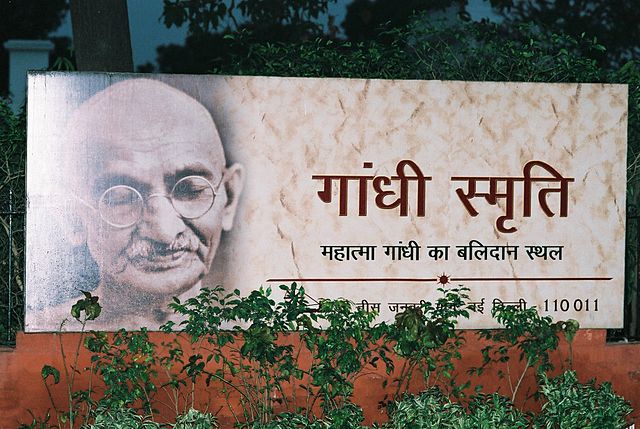
“Welcome Mr. Gandhi” —Winston Churchill
“Welcome Mr. Gandhi” first appeared in The Weekly Standard scrapbook for 21 July 2014.
Gandhi in the Square
Every time you realize how badly the media mangles something you know about, you wonder how well they are reporting everything else.
The announcement that a statue of Gandhi would be placed in Parliament Square near that of Winston Churchill unleashed a barrage of ignorance. Would Churchill wish to share space with his “onetime nemesis”?
The Associated Press quoted Churchill’s famous “half-naked fakir” crack (inaccurately), and said he called Gandhi a “middling lawyer.” (Churchill’s term was “Middle Temple lawyer,” something else entirely.)
The Wall Street Journal worried that Parliament Square also includes a statue of Jan Smuts, “a prime minister of South Africa in the early 20th century who favored segregation.”
Dear oh dear.
Smuts was prime minister in 1939-48, not early in the century. He was voted out when he campaigned in favor of relaxing segregation. As a junior minister in 1906 Smuts did oppose equal rights for the Indian minority. But here he disagreed with his longtime friend Winston Churchill, then Under-Secretary of State for the Colonies.
A few stray truths
Gandhi in 1935 remarked: “I have got a good recollection of Mr. Churchill when he was in the Colonial Office and somehow or other since then I have held the opinion that I can always rely on his sympathy and goodwill.”
Gandhi said this to his chief lieutenant, Ghanshyam Birla, who lunched with Churchill at Chartwell following passage of the Government of India Act, a step toward independence. Churchill had opposed this bill, and had said some pretty rough things.
But Churchill was magnanimous—a quality sadly lacking among politicians today. “Mr. Gandhi has gone very high in my esteem since he stood up for the Untouchables,” he told Birla. “I do not like the Bill but it is now on the Statute Book….So make it a success.”
Birla asked: “What is your test of success?” Churchill replied: “…improvement in the lot of the masses….I do not care whether you are more or less loyal to Great Britain. I do not mind about education, but give the masses more butter….Make every tiller of the soil his own landlord….Provide a good bull for every village…. Use the powers that are offered and make the thing a success.”
Among other things, such statements suggest a better understanding of contemporary India than Churchill is said to have had by his many critics, who insist that he thought of it in terms of a 19th century Victorian.
On independence
Churchill did have a tic about an Indian independence movement led by the Brahmin class. But before we pigeonhole him as an unrepentant imperialist, consider what he and Gandhi had in common.
Gandhi and Churchill viewed a break-up of the subcontinent with regret and sadness. Both feared religious extremism, Hindu or Muslim. Each believed in the peaceful settlement of boundary disputes. Both strove for liberty. Such precepts more widely held would be welcome today. In Parliament Square, Churchill will be fine with Gandhi.







2 thoughts on ““Welcome Mr. Gandhi” —Winston Churchill”
“But that is not all. To abandon India to the rule of the Brahmins would be an act of cruel and wicked negligence. It would shame for ever those who bore its guilt. These Brahmins who mouth and patter the principles of Western Liberalism, and pose as philosophic and democratic politicians, are the same Brahmins who deny the primary rights of existence to nearly sixty millions of their own fellow countrymen whom they call ‘untouchable’, and whom they have by thousands of years of oppression actually taught to accept this sad position. They will not eat with these sixty millions, nor drink with them, nor treat them as human beings. They consider themselves contaminated even by their approach. And then in a moment they turn round and begin chopping logic with John Stuart Mill, or pleading the rights of man with Jean Jacques Rousseau.” —Churchill, “Our Duty in India,” 1931
=
You are quite right to recall this statement as a valid example of his thinking during the India debate. The Indian historian Tirthankar Roy writes: “As a society that had invented the idea that the touch of another person could cause pollution, India did not need the British to know how to oppress and degrade other people.” Your quotation supports Dr. Roy’s thesis that the worst things Churchill said about Indians were directed at the ruling Brahmins, whom he regarded as hypocrites for demanding independence but not equal rights for all. —RML
“Churchill was ruthlessly dismissive of Indian political aspirations. He could scarcely be expected to forget that the Mahatma had offered to mediate Britain’s surrender to Hitler, whom the standard-bearer of non-violence and Indian freedom described as ‘not a bad man.'” Gandhi in 1940 wrote an open letter to the British people, urging them to “lay down arms and accept whatever fate Hitler decided.You will invite Herr Hitler and Signor Mussolini to take what they want of the countries you call your possessions. Let them take possession of your beautiful island with your many beautiful buildings. You will give all of these, but neither your souls nor your minds.” (Max Hastings, Finest Years: Churchill as Warlord (2009) 255; Gandhi’s remark is quoted from D G Tendulkar, Mahatma (New Delhi 1969) V.291.)
–
Mr. Gandhi was a clever man and it’s possible to believe he said that tongue-in-cheek. But what about this? “I do not consider Hitler to be as bad as he is depicted. He is showing an ability that is amazing and seems to be gaining his victories without much bloodshed.” —May 1940, the month Churchill became prime minister. Neither man was without faults. But their relations have been misrepresented by ignorant media and headline seekers. —RML
Comments are closed.